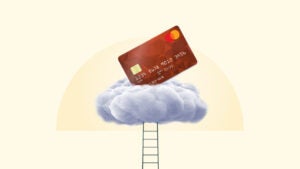Why are store cards so much easier to get?

Key takeaways
- Store cards feature with easier approval than traditional credit cards partly due to their limitations to one store or brand, and partly due to low credit limits.
- These cards also come with higher APRs than traditional credit cards, which can make your purchases more expensive.
- Still, store cards can help you build or rebuild your credit, as well as help you save money at your favorite brands through discounts, coupons and special cardholder offers.
- Compare store card alternatives to improve your credit without the limitations of store cards — and with the potential to earn rewards along the way.
Some types of credit cards are easier to qualify for than the rest, either because they require collateral or because they come with limitations. Falling into the latter category are store credit cards, which can only be used within a single type of store or a family of stores. That said, retail credit cards offered by stores still have their share of benefits, and they can be incredibly useful when it comes to building credit in the first place.
If you’re wondering whether you should apply for a store credit card or whether you can actually get approved, it helps to know how store cards work, as well as their limitations and pitfalls. You’ll also want to know some alternatives to store credit cards that can help you learn positive credit habits while building credit for the future along the way.
Can you more easily be approved for a store card than a traditional credit card?
Generally, yes — store credit cards that are co-branded with a specific store are among the easier credit cards to see approval for. This is partly due to the fact these cards can only be used in one store or with one brand, but it’s also because they tend to come with low credit limits overall.
For these reasons, store credit cards can make great starter credit cards for young adults who are just starting out in their journey to good credit. A store credit card gives you a chance to make purchases and get accustomed to paying a credit card bill each month. More importantly, store credit cards report balances and payments to the major credit bureaus, helping you to build your credit score over time.
Another benefit of store cards comes in the form of the perks they offer. While store card benefits vary, many come with points or discounts on purchases, ongoing promotions for shoppers, regular coupons, special retail events and other benefits that apply only for loyal cardholders.
The limitations and pitfalls of store credit cards
All this said, it’s worth noting that many store credit cards are not run on major networks like Visa or Mastercard. Store cards are issued by a range of card issuers, including Synchrony Bank and Capital One, and are designed to be used at one specific store or within a network of stores instead.
Store cards have other limitations and pitfalls, including low credit limits and high APRs. Take the Kohl’s Credit Card — this store card is issued by Capital One, yet it’s only useful at Kohl’s stores or at Kohls.com. The Kohl’s Credit Card also comes with a variable APR of 31.24 percent, and the starting credit limit for consumers can be as low as a few hundred dollars.
Another example is the Amazon Store Card, which is issued by Synchrony Bank. This store card comes with a variable APR of 29.99 percent, and applicants are likely to start off with a low credit limit at first. Similar to the Kohl’s Credit Card, the Amazon Store Cardt card can only be used for purchases with the online retailer.
Along with the potential for sky-high interest rates and low credit limits, the biggest downside of store credit cards is that you can’t use them for regular purchases or emergency expenses that pop up. A Kohl’s credit card or Amazon store card won’t do you any good if you have an unexpected medical bill you have to pay, or your car breaks down and you need to have it fixed. You’re limited to purchasing merchandise instead.
Alternatives to store credit cards
If you’re looking to build your credit with a credit card but don’t want to deal with the limitations of store cards, consider the following card options that can help you build credit and earn rewards along the way.
Discover it® Secured Credit Card: Best for no credit
If you have no credit history and are looking for a starter credit card to help you build credit from scratch, the Discover it® Secured Credit Card is worth considering. This secured credit card requires a refundable cash deposit of at least $200 as collateral, but it doesn’t have an annual fee, and it reports on-time payments to the three credit bureaus to help you build credit over time.
Cardholders can also earn 2 percent cash back on up to $1,000 spent at restaurants and gas stations each quarter (then 1 percent) and 1 percent cash back on other purchases. Discover will also match all the cash back you’ve earned at the end of your first year.
Most importantly, Discover automatically reviews your account after seven months of on-time payments to determine whether you’re eligible to graduate to an unsecured credit card, which could mean a refund of your security deposit as well asa higher credit limit.
Capital One QuicksilverOne Cash Rewards Credit Card: Best for fair credit
If you have a fair FICO score of 580 to 669, you could qualify for an unsecured credit card like the Capital One QuicksilverOne Rewards Credit Card. This card requires an annual fee of $39, yet it offers a flat 1.5 percent cash back on all purchases.
Cardholders also get six months of complimentary Uber One membership through Nov. 14, 2024, and may qualify for a higher credit limit after at least six months of on-time payments.
Wells Fargo Active Cash® Card: Best for good credit
The Wells Fargo Active Cash® Card is another option to consider if you have good or excellent credit — a FICO score of 670 to 850 — and you’re looking to earn rewards for spending. This no-annual-fee card starts new members off with $200 cash rewards after spending $500 within three months of account opening, and all purchases earn a flat rate of 2 percent cash back.
Cardholders also get 0 percent APR on purchases and qualifying balance transfers for 15 months (balance transfers must be made within 120 days to qualify for the intro APR and intro 3 percent balance transfer fe. Ongoing balance transfer fee of up to 5 percent, minimum of $5. After the intrp period, a variable APR of 20.24 percent, 25.24 percent or 29.99 percent applies. The card also comes with cellphone protection of up to $600 per claim (minus a $25 deductible) against covered damage or theft when you pay your monthly cellphone bill with the card.
The bottom line
Store credit cards are somewhat limited in how you can use them and come with high interest rates to boot, yet they still have their place. In fact, many store credit cards offer valuable discounts and other promotions that can make them ideal for consumers who shop in the same store or within a family of stores often.
That said, store credit cards work best as companion cards to more traditional credit cards. By using a store card along with a traditional credit card that can be used anywhere cards are accepted, you can enjoy rewards and perks, but still have a line of credit to fall back on in emergencies.
Why we ask for feedback Your feedback helps us improve our content and services. It takes less than a minute to complete.
Your responses are anonymous and will only be used for improving our website.






